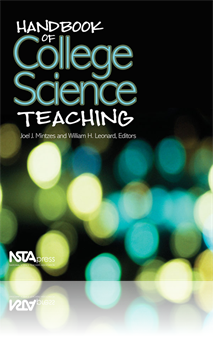All Book Chapters
Book Chapter
Converting Your Lab from Verification to Inquiry
This chapter offers insight into how to create laboratories that provide students with research experiences within the constraints of time, resources, and course formats that most faculty face. It provides a research-based rationale for investigative...
Book Chapter
Technology-Enriched Learning Environments in University Chemistry
Science and technology courses in higher education have traditionally been composed of three elements—lecture, recitation, and evaluation—and have been conducted in lecture-based, teacher-centered settings. In recent years, a growing number of un...
Book Chapter
Animations (rapidly changing sequences of drawn objects that simulate motion as in a movie) have been advocated for classroom use for years (Hall 1996), and there is good evidence to support the value of this practice. However, there is general agree...
Book Chapter
Instructional Technology: A Review of Research and Recommendations for Use
Carefully chosen and properly used instructional technology can increase student learning and student interest. Poorly used instructional technology can do the opposite; we have all experienced this phenomenon when victimized by an enthusiastic new P...
Book Chapter
Web-Based Practice and Assessment Systems in Science
In this chapter the authors describe the specific kinds of items that they have developed for use in automated practice systems and discuss some issues related to web-based learning. Next, they describe in broad terms other web implementations. They ...
Book Chapter
Teaching Students to Evaluate the Accuracy of Science Information on the Internet
This chapter addresses the issue of variable accuracy of science information on the internet, how to address this topic in undergraduate science courses, how to make students aware of this situation (if they are not already), and how to begin to trai...
Book Chapter
Science, Technology, and the Learning Disabled: A Review of the Literature
The lack of research studies that examine the use of technology as a tool to support the learning of science among the learning disabled is an important limitation of research in science teaching....
Book Chapter
Diversity in the Physical Science Curriculum: The Intellectual Challenge
In this chapter, the author argues that integrating science with the real and pressing concerns of human beings on this planet is a powerful way to give race, ethnicity, class, and gender a rightful place in our science classrooms. In the process, we...
Book Chapter
Incorporating Cultural Diversity Into College Science
Due to the globalization of world economics, advances in information technologies, and the complex interconnections of global environmental issues, postsecondary institutions recognize the growing importance of offering courses about other cultures a...
Book Chapter
Motivation to Learn in College Science
All college science teachers share the important goal of motivating college students to learn science. In this chapter, the authors discuss motivational theory and research in college teaching and draw implications for effective practices. They also ...
Book Chapter
Applying Conceptual Change Strategies to College Science Teaching
This chapter will focus on meaningful learning and conceptual change from the perspective of science education. The authors describe in detail two case studies of conceptual change-based curricula—one that focuses on the particulate nature of matte...
Book Chapter
Ensuring That College Graduates Are Science Literate: Implications of K-12 Benchmarks and Standards
This chapter draws on some fundamental lessons learned about science teaching and learning at the K—12 level that are likely to be applicable to a higher-education context. Recommendations are made in three areas that seem especially important to i...
Book Chapter
The High-School-to-College Transition in Science
It is important to remember the variety of competing events and pressures that first-year students face while adjusting to a different life in college. Science faculty need to understand why some students struggle during their first year so that facu...
Book Chapter
Factors Influencing Success in Introductory College Science
Studies on the influence of pre-college factors on success in college science are well established. Most studies have been carried out in single institutions (e.g., Alters 1995; Hart and Cottle 1993), with only a few collecting samples from multiple ...
Book Chapter
Assessment Practices in College Science: Trends From the National Study of Post-Secondary Faculty
The trend toward using performance-based or authentic assessment is evident at K—12 levels of schooling (Stiggins 1991) but less evident in college science teaching. Therefore, this study used the National Study of Postsecondary Faculty (NSOPF), sp...



